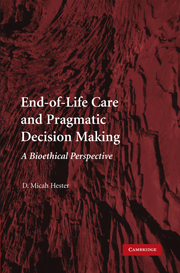3 - Radical Experience and Tragic Duty
Moral Dying
Published online by Cambridge University Press: 05 June 2012
Summary
There are times when a man ought to be more afraid of living than dying.
F. J. E. Woodbridge[T]here are situations in which, because of the conditions of survival, the worst thing we can know of anyone is that he has survived.
Sidney HookThe account of “meaning” and “significance” given in Chapter 2 was, it should be clear, a restatement under a different guise of radical empiricism itself – that is, “meaningful living” is another name for radically empirical, reflective narrative. Since meaning develops from the operations of intelligent deliberation upon individualized ideals, what comes next in our account of the moral implications of radical empiricism is a discussion of moral deliberation that can move from the level of particularity to the more “universal” (and back). To do so, the discussion that follows turns to a more traditional ethical language, one that takes us from the existence of personal desires (one form of idealizing) to the requirements of moral obligations (what follows for ourselves and others when desires are deemed worthy of pursuit). Again, even with this turn to a more traditional moral language or “obligations,” what follows is yet another restatement of our radically empirical account of meaning that will also demonstrate how moral deliberation on end-of-life issues arises from the specific situations of dying persons while employing concepts and methods that make decisions around the end of life ethical.
- Type
- Chapter
- Information
- End-of-Life Care and Pragmatic Decision MakingA Bioethical Perspective, pp. 41 - 58Publisher: Cambridge University PressPrint publication year: 2009

